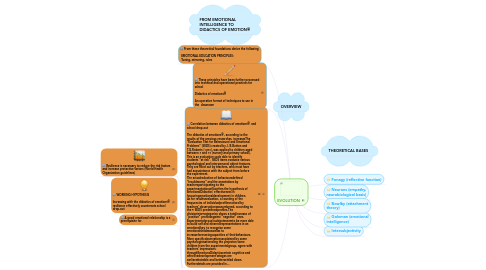EVOLUTION
Mariagrazia Mariにより

1. Correlation between didactics of emotions® and school drop-out The didactics of emotions®, according to the results of the previous researches, increasesThe “Evaluation Test for Behavioural and Emotional Problems” (SEDS) created by J. B.Button and T.G.Roberts (1986), was applied to children aged between 3 and 10 (nursery and primary school). This is an evaluation scale able to identify students “at risk”. SEDS items evaluate various psychological and interpersonal object features. They are filled out by teachers, who must have had acquaintance with the subject from before the experiment. The actualreduction of behavioursdefined “troublesome” and the annotations by teachersparticipating to the experimentationwillconfirm the hypothesis of EmotionalDidactics’ effectiveness in favouringemotionaldevelopment in children. As for resultsevaluation, a counting of the frequencies of individualprofilesnoticed by teachers’ observationwasnumbered, according to the 5 SEDS predefinedprofiles.The divisioninto5categories shows a totalincrease of “positive” profilesagainst “negative” ones. Experimentalgroup’ssubjectsseemto be more able to build self and externalrepresentations in an emotionalkey, to recognize some emotionalshadesaswellas to increaseforeseeingcapacities of theirbehaviours. More specificobservationsexplained by some psychologistsattending the projecton some children from the experimentalgroup, agree with teachers’ impressions: throughEmotionsDidacticscertain cognitive and affectivedevelopment’sstages are earlierattainable and bettersettled down. Furtherdetails are provided in…
1.1. Resilience is necessary to reduce the risk factors and increase protective factors (World Health Organization guidelines)
1.2. WORKING HYPOTHESIS Increasing with the didactics of emotions® resilience effectively counteracts school drop-out
1.3. A good emotional relationship is a prerequisite for
2. These principles have been further processed into technical and operational practices for school Didactics of emotions® An operative format of techniques to use in the classroom
3. From these theoretical foundations derive the following EMOTIONAL EDUCATION PRINCIPLES: Tuning, mirroring, rules
4. OVERVIEW
5. FROM EMOTIONAL INTELLIGENCE TO DIDACTICS OF EMOTION®
6. Intersubjectivity
7. Goleman (emotional intelligence)
8. Fonagy (reflective function)
9. Neurons (empathy, neurobiological basis)
10. Bowlby (attachment theory)
11. THEORETICAL BASES


